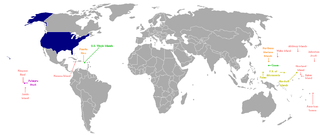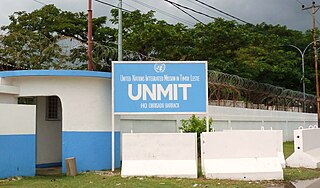
United Nations Security Council Resolution 242 (S/RES/242) was adopted unanimously by the UN Security Council on November 22, 1967, in the aftermath of the Six-Day War. It was adopted under Chapter VI of the UN Charter. The resolution was sponsored by British ambassador Lord Caradon and was one of five drafts under consideration.
A United Nations General Assembly resolution is a decision or declaration voted on by all member states of the United Nations in the General Assembly.

United Nations Security Council resolution 1559, adopted on 2 September 2004, after recalling resolutions 425 (1978), 426 (1978), 520 (1982) and 1553 (2004) on the situation in Lebanon, the Council supported free and fair presidential elections in Lebanon, urging the Lebanese government to establish control over its territory, disarm militias like Hezbollah, and facilitate the withdrawal of any remaining foreign forces from the country.
United Nations Security Council Resolution 163, adopted on June 9, 1961, after General Assembly Resolution 1603 declaring Angola a Non-Self-Governing Territory the Council reaffirmed that resolution calling on Portugal to act in accordance with the terms. The Council called upon the Portuguese to desist from repressive measures and to extend every facility to the Sub-Committee on the Situation in Angola, appointed under the terms of the GA resolution, as well as expressing its hope that a peaceful solution will be found and requested that the Sub-Committee report to the Council and GA as soon as possible.
United Nations Security Council Resolution 180, adopted on July 31, 1963, affirmed that Portugal claiming its overseas territories as part of metropolitan Portugal was contrary to the principles of the Charter. The Council deemed Portugal's actions and attitude as seriously disturbing to peace and security in Africa.
United Nations Security Council Resolution 218, adopted on November 23, 1965, after recalling previous resolutions on the topic, and Portugal's failure to implement them, the Council again demanded that Portugal withdrawal its military presence from her colonies and enter negotiations with political parties there regarding independence.
United Nations Security Council Resolution 275, adopted on December 22, 1969, after a letter from the representative of Guinea and observing that these incidents by Portugal jeopardize international peace and security, the Council called upon Portugal to desist from violating the sovereignty and territorial integrity of Guinea. The Council deeply deplored the loss of life and heavy damage to several Guinean villages inflicted by the action from Guinea-Bissau, a territory under Portuguese administration, solemnly warning Portugal that if such acts were to be repeated in the future the Council would consider further steps to give effect to the resolution. It also called upon Portugal to release a motor barge by the name of Patrice Lumumba and all of its passengers.
United Nations Security Council Resolution 290, adopted on December 8, 1970, after more invasions of the territory of the Republic of Guinea by naval and military units of Portugal on November 22/23 and 27/28, the Council reaffirmed its numerous previous resolutions on the topic, including the right of the peoples of Angola, Mozambique and Portuguese Guinea to be freed from the Portuguese Empire ruled by the Estado Novo regime. The Council endorsed the conclusions of the report by the Special Mission to the Republic of Guinea, strongly condemned the Portuguese Government, demanded that full compensation be paid to the Republic and declared that Portuguese colonialism was a serious threat to the peace and security of Africa.
United Nations Security Council Resolution 302, adopted on November 24, 1971, after reaffirming previous resolutions on the topic, the Council expressed its appreciation for the work accomplished by the Special Mission established in resolution 294. The Council deplored the lack of co-operation with the Special Mission by the Portuguese and called upon its government to take effective measures so that the territorial integrity of Senegal would be respected and to prevent acts of violence and destruction against the territory and its people.
United Nations Security Council Resolution 312, adopted on February 4, 1972, after reaffirming previous resolutions on the topic and deploring those who failed to conform to them the Council called upon Portugal to immediately recognize the right of the peoples of her colonies to self-determination, to cease all acts of repression against the peoples of Angola, Mozambique and Guinea (Bissau), to withdraw its armed forces from those areas, to promulgate an unconditional political amnesty and to transfer power to freely elected native representative institutions.
United Nations Security Council Resolution 321, adopted on October 23, 1972, after reaffirming previous resolutions, the Council expressed its concern that Portugal persistently refused to comply with them. The Council attacked the latest cross-border action by the Portuguese army against Senegalese territory and demanded that the Portuguese cease any further acts of violence. The Council went on to reaffirm their position that Portugal's continued holding of colonies in Africa was unjust and that the native peoples of those colonies should be allowed self-determination.

United Nations Security Council Resolution 384, adopted on December 22, 1975, noted statements from the representatives of Portugal, Indonesia and East Timor and recognized the right of the people of East Timor to self-determination and independence in accordance with the Charter. The Council expressed its grave concern with the deterioration of the situation in East Timor, deplored the intervention of the armed forces of Indonesia in that nation and expressed its regret that Portugal did not discharge fully its responsibilities as administering Power.

United Nations Security Council resolution 683, adopted on 22 December 1990, after recalling Resolution 21 (1947) which approved the Trusteeship Territory of the Japanese Mandated Islands as well as Chapter XII of the United Nations Charter which established the United Nations Trusteeship system, the council determined that, in the light of entry into force of new status agreements for the Federated States of Micronesia, the Marshall Islands and the Northern Mariana Islands, the objectives of the Trusteeship Agreement had been completed and therefore ended the Trusteeship Agreement with those entities.

United Nations Security Council resolution 978, adopted unanimously on 27 February 1995, after recalling all previous resolutions on Rwanda, including 935 (1994) and 955 (1994), the Council instructed Member States on the arrest and detention of persons responsible for acts during the Rwandan genocide, within the jurisdiction of the International Criminal Tribunal for Rwanda (ICTR).
United Nations Security Council resolution 1246, adopted unanimously on 11 June 1999, after recalling previous resolutions on East Timor, particularly Resolution 1236 (1999), the council established the United Nations Mission in East Timor (UNAMET) to organise and conduct the East Timor Special Autonomy Referendum on the future status of East Timor, scheduled for August 1999.
United Nations Security Council resolution 1264, adopted unanimously on 15 September 1999, after recalling previous resolutions on East Timor (Timor-Leste), the Council authorised the establishment of the multinational International Force for East Timor (INTERFET) to restore peace and security in the territory, facilitate humanitarian assistance and protect the United Nations Mission in East Timor (UNAMET).

United Nations Security Council resolution 1338, adopted unanimously on 31 January 2001, after recalling previous resolutions on East Timor (Timor-Leste), particularly resolutions 1272 (1999) and 1319 (2000), the Council extended the mandate of the United Nations Transitional Administration in East Timor (UNTAET) for a year until 31 January 2002.

United Nations Security Council Resolution 1690, adopted unanimously on June 20, 2006, after reaffirming previous resolutions on East Timor (Timor-Leste), particularly resolutions 1599 (2005) and 1677 (2006), the Council renewed the mandate of the United Nations Office in Timor-Leste (UNOTIL) for two months until August 20, 2006.

United Nations Security Council Resolution 1802 was unanimously adopted on 25 February 2008.








